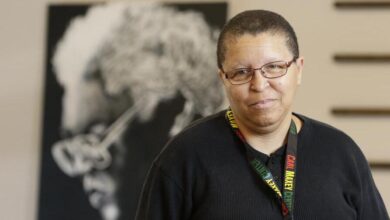Foreign-Born Population in New Hampshire Finds Opportunity

CONCORD, N.H.—Many left countries at war, or foreign refugee camps where their lives were in limbo. Some came for a better life, a safe place to raise a family and educate their children. All were willing to grapple with the massive culture shock of moving from Africa, Southeast Asia and the Middle East to a place with a different language, foreign customs and harsh winters.
That place is New Hampshire, No. 2 overall in U.S. News and World Report’s 2019 Best States rankings and No. 1 for opportunity. And while the Granite State is long known for its homogeneity (it’s 94 percent white), the foreign-born population is an increasing presence, with the international population growing by more than 53 percent, between 2000 and 2017.
The presence of immigrants and refugees – “New Americans,” as they are known – are seen in Concord’s first permanent mosque and the face of a Burundi bride, decked out in brightly colored wedding attire. It is heard in New Hampshire schools, where 136 foreign languages are spoken by students, and at Second Start, a resource for New Americans and where a Congolese immigrant, who speaks five languages, is teaching other new arrivals how to drive.
“When I first came here (in 2013), I was desperate,” says Morgan Mbuyi, 41, who left a strife-torn Democratic Republic of the Congo to go to a refugee camp in Namibia before being resettled in New Hampshire. It was hard to find a job without references, and “there were not many black people,” he says. Mbuyi got some experience volunteering, and has worked as an interpreter and as truck loader. He now drives a bus in addition to his work at Second Start. “If you’ve got a driver’s license, you become independent,” Mbuyi says.
A Culture of Independence
Independence is a stubbornly held trait in New Hampshire, where the state motto is “Live Free or Die.” It has no personal income tax. “Undeclared” voters outnumber Democrats and Republicans.
There is a pride here in being self-sufficient, with residents making up their own minds without government interference. (It’s the only state that does not require adults to use seat belts.)
Browse Photos of the 50 States

But the do-it-yourself mentality has not made New Americans feel unwelcome here, residents say. Instead, operations such as Second Start and other refugee and immigrant assistance groups have helped newcomers help themselves. There are surely struggles – whether it’s adjusting from a hot climate to a snowy one, or finding work without a verifiable job history – but newcomers say they are finding their way.
“The American people are such beautiful people; they are happy to speak with me and my family,” says Narwas Altaher, 38, an Iraqi-born, now U.S. citizen who came to the States with her husband after he served as an interpreter for the U.S. military in Iraq. Altaher says she does not feel an anti-immigrant sentiment in Concord. People might ask about her head covering, she says, but as a matter of curiosity and not contempt.
Ghana Sharma, a Bhutanese native who came to the Granite State in 2009 and is now a U.S. citizen, says he plans to stay in New Hampshire. “It’s not too crowded. It’s peaceful. There’s a lot of opportunity, and welcoming (of) New Americans here,” the 44-year-old Sharma explains.
A Safe Haven for the War-Weary
New Hampshire is an assigned destination for some of the state’s foreign-born population, since U.S. refugee resettlement agencies decide where people go after they have been vetted and given refugee status. From fiscal years 2011-2018, New Hampshire became home for 3,177 refugees, mostly from African nations, according to Amy Marchildon, director of services for New Americans at Ascentria Care Alliance, which resettles refugees fleeing war and persecution. The number of refugees has dropped, though, with the Trump administration’s tighter regulations, Marchildon notes. In New Hampshire alone, the number of resettle refugees went from 518 in fiscal year 2016 to 362 in fiscal 2017 to 162 in fiscal 2018, she says.

Ellen Webber for USN&WR
A board displays where students have come from at Second Start, a nonprofit that offers newcomers English lessons and driving school at affordable prices.
Those who do get accepted into the program seem to find the Granite State appealing. “For many refugee people, I’ve heard the dominant feeling (about New Hampshire) is feeling safe and secure,” she says. Other, non-refugee immigrants chose New Hampshire as a new home.
The foreign-born population in the state went from 3.7% of the population in 1990, to 4.4% in 2000 and to 6.2% in 2017, according to the Migration Policy Institute. About 5,000 English learners (for whom English is a second language) attend New Hampshire schools. NHTI, Concord’s Community College has students from more than 90 nations.
There are proudly told success stories among the New American arrivals. Esther Elonga, a refugee from Congo and Uganda, is attending Harvard on a four-year scholarship. The 20-year-old says she’s mulling an M.D.-Ph.D., and attributes her achievements to hard work and determined parents. “The good part of Concord is that it’s a place that’s safe,” she says, allowing her to focus on studies instead of the violence in her home country.
Afghan refugee Safiya Wazir, whose family fled the Taliban, won a seat in 2018 in the New Hampshire House of Representatives, becoming the first refugee to serve in the statehouse. Others have started businesses such as Foresight Tax Services in Concord and Manchester, as well as the French pastry shop La Maison Navarre in Portsmouth.
N.H. Ranks High for Affordability, Equality
The state ranks second in overall equality and in economic opportunity, and has the lowest poverty index in the nation. When it comes to race, despite its relative lack of diversity, New Hampshire comes in first place for the narrowest income gap, and second nationwide for the narrowest education gap. The state also ranks well when it comes to household income, low food insecurity and the Gini index, a statistical measure of wealth and inequality.
“Government’s foremost guarantee to its people must be that of equal opportunity. Our job is to open up as many doors of equal opportunity as possible, creating an atmosphere where families, kids, businesses, and individuals can grow and thrive,” New Hampshire Gov. Chris Sununu told U.S. News in a statement responding to the rankings.
“Today in the Granite State, more people are working than ever before, business taxes are at their lowest this century, and a child’s neighborhood no longer defines their chance for a quality education. Our model is a success story,” he said.
For many newcomers “there’s a look of disbelief” when they get off the plane in New Hampshire and encounter a totally new environment – especially if it’s winter, says Becky Field, a photographer who began chronicling the New American population with her camera in 2011. But the availability of housing and the job opportunities – especially entry-level jobs that make a good starting point for new arrivals – have made New Hampshire an appealing place for them to stay, she says.
Sununu in 2017 formed the Governor’s Advisory Council on Diversity and Inclusion and established the first-ever Bureau for Civil Rights at the New Hampshire Department of Justice to increase and protect opportunity for all Granite Staters, the governor’s office notes.
Nonprofits have also stepped up. Second Start – which began more than 45 years ago as an adult education center – now offers newcomers English lessons and driving school at affordable prices. “To develop economically, you’ve got to be mobile. And there’s (little) public transportation anywhere in New Hampshire,” says Second Start Executive Director James Snodgrass, who started the driving school for adult New Americans.
Welcoming New Hampshire is another organization that promotes acceptance and integration of immigrants, holding cultural and educational events and working to advance civic engagement among newcomers to the country. “I want to change the perception of immigrants from being needy people, to being people who come here to contribute to society,” says the group’s director, Eva Costello, a Venezuela native.
The Regional Economic Development Center offers the NH New American Loan Fund to lend money to those who may be “unbanked” and have difficulty getting a regular bank loan. The group also works alone and with partners to provide “microloans,” sums as little as $5,000, to help entrepreneurs purchase equipment and inventory to start a business.
And the New Americans, too, step up to help those who came after them. Clement Kigugu, who is from Rwanda, works with Second Start, interpreted for non-English speakers trying to get health insurance, runs a church, and works with young New Americans, including recruiting them for a church choir to keep them busy and out of trouble.
“I would really hope to give back as much as I got,” Kigugu says. And New Hampshire, for him and his community, is home.
























































